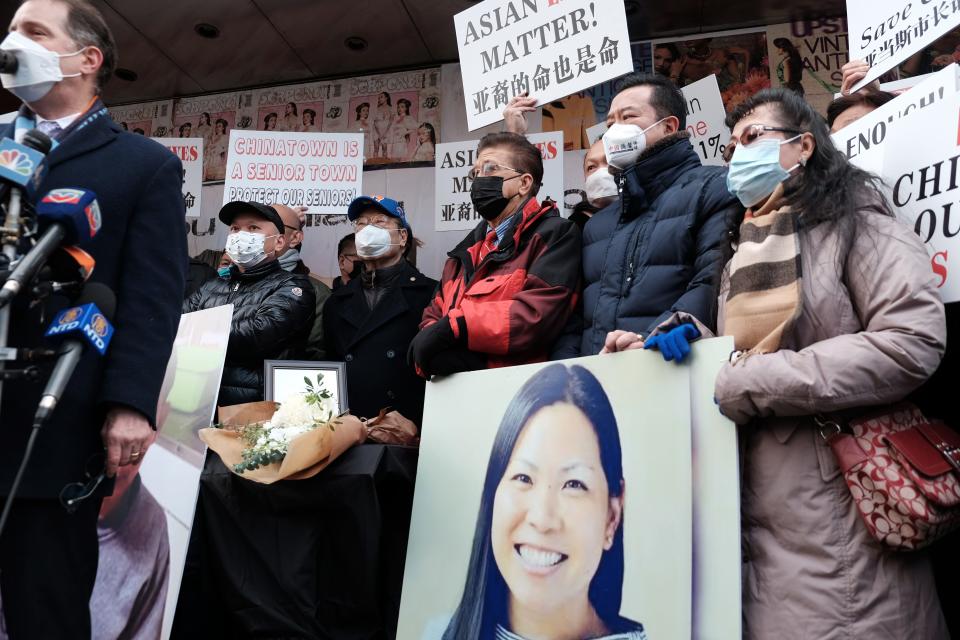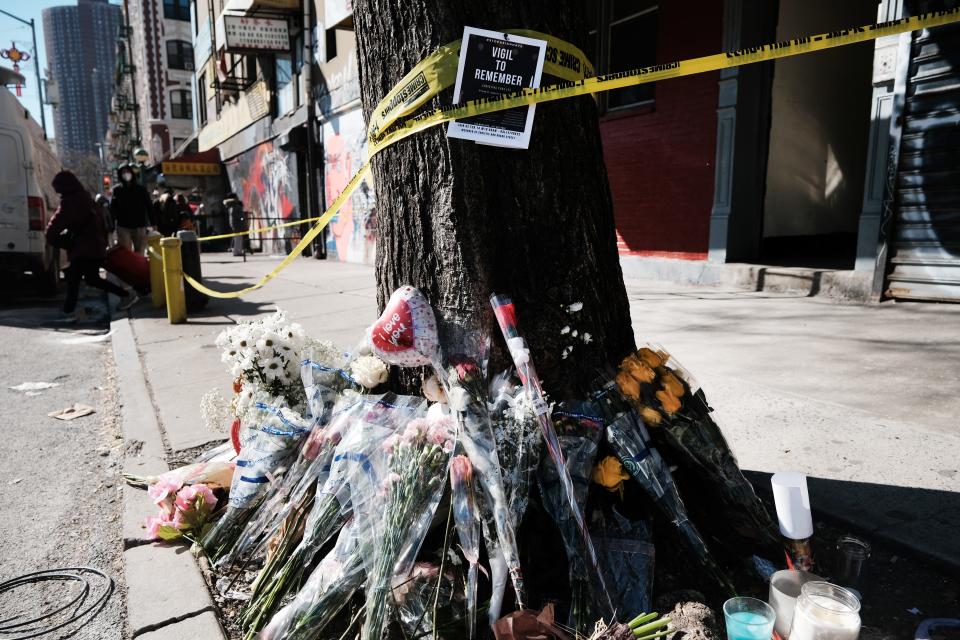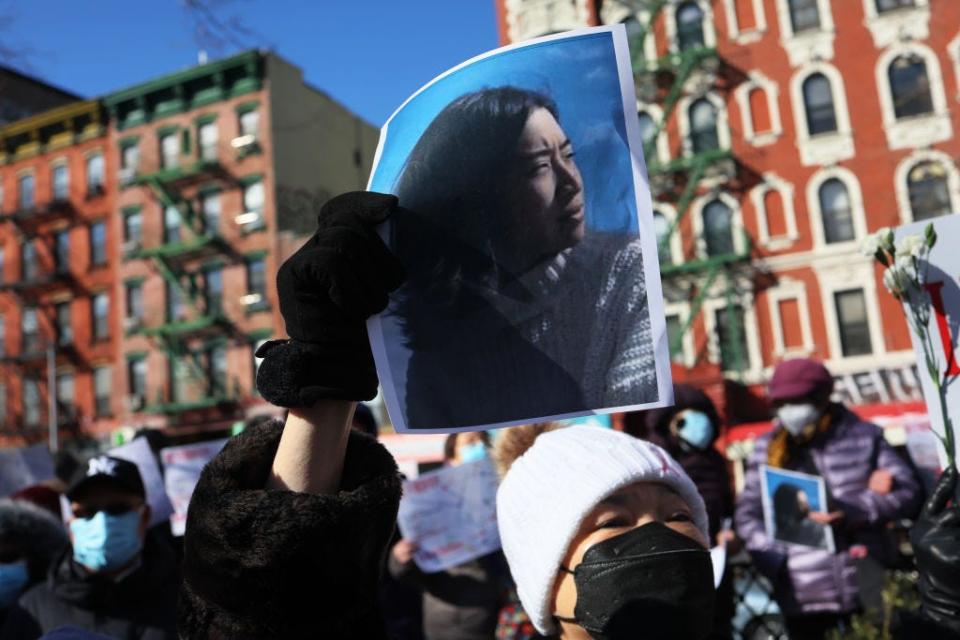Asian women continue to face 'terrifying' attacks in the US. What advocates say needs to change.
Asian women continue to face 'terrifying' attacks in the US. Here's what advocates say needs to change.
Bew Jirajariyawetch was waiting for a subway train in New York City when a man grabbed her from behind, assaulted her and took her purse.
She was hospitalized and has physically recovered. But three months later, Jirajariyawetch, 23, said she continues to be retraumatized by reports of attacks on other women of Asian descent in the city.
"It's still terrifying going out," said Jirajariyawetch, who is Thai.
Last month, Michelle Alyssa Go, 40, was on a subway platform when she was pushed to her death. And last weekend, Christina Yuna Lee, 35, was followed into her apartment and stabbed to death.
"They don't do anything wrong at all, but things tragically still happen over and over again," Jirajariyawetch said. "At least I'm alive right now. The others didn't have a chance."
The ongoing violence against women of Asian descent in the U.S. continues to outrage Americans and strike fear among Asian American and Pacific Islander communities.
While some public figures have said the suspects shouldn't have been out on the streets in the first place due to prior criminal histories, others say the answer isn't so simple.
Elected officials, advocates and New York City residents who spoke to USA TODAY said the attacks stem from a confluence of deeply rooted societal issues in the U.S. – patterns of gender- and race-based violence, poverty, homelessness, substance abuse and mental illness.
"The reality is, we need to address systemic issues in order to solve this very desperate, dire issue that many of us are feeling in a very real way," said Sung Yeon Choimorrow, executive director of the National Asian Pacific American Women's Forum.
'Fear and anxiety': New Jersey Asians say they're avoiding New York City after brutal killing

Violence against Asian American and Pacific Islander communities has surged across the U.S. amid the coronavirus pandemic, with women reporting incidents at twice the rate as men, according to Stop AAPI Hate. In December, the New York City Police Department reported incidents targeting Asians rose by 361% over the previous year.
New York City Council member Julie Won said a pattern has emerged in the recent attacks: Most of the victims are women or seniors, and many of the suspects are men struggling with homelessness, substance abuse and mental health issues. Choimorrow agreed the incidents are "strikingly similar."
Advocates say bringing an end to the attacks requires an understanding of the racial and gender-based aspects of the crimes, even if the official charges don't reflect those motivations. Many attacks on members of Asian American and Pacific Islander communities are not investigated as hate crimes.
"There needs to be an acknowledgement, one, of how Asian American women are uniquely targeted because of the stereotypes there are about us," Choimorrow said. "We're easier targets because we're also assumed to be docile and submissive."
Asian American women have been fetishized and portrayed as hypersexualized and exotic throughout U.S. history, particularly in media, and the deadly consequences of the stereotype haven't been widely recognized in mainstream culture until now, Won and Choimorrow said.
It's particularly important to talk about how race and gender bias play into the crimes in light of the coming one-year anniversary of the deadly Atlanta-area shootings, said Grace Lee, a community organizer and a candidate for state assembly. Last March, a man targeted three spas, killing eight people, including six women of Asian descent.
"We're not seeing enough action and attention paid to how race and gender are integral to the motivations behind these crimes," said Lee, who has lived in Lower Manhattan for 15 years. "I am raising three daughters, Asian daughters, and I feel scared."
Atlanta shooting: Attack spotlights vulnerability of spa workers

Some public figures have cast blame on reforms to New York's bail laws, which passed in 2019 and eliminated cash bail for most misdemeanor and nonviolent felony charges.
Shirley Ng, a community organizer in Manhattan's Chinatown with the Asian American Legal Defense and Education Fund, said there is a feeling among her community that people arrested for crimes are being prematurely released.
Newly elected New York City Mayor Eric Adams, a Democrat who campaigned on public safety issues, was questioned about the issue Monday in the wake of Lee's murder. Asked by a reporter whether the suspect in Lee's murder was the "poster child" for bail reform failures, Adams said the defendant "should have not been on the streets."
"We need to make sure we close the loopholes that allow dangerous people to be on the street," Adams said.
The suspect in Lee's case, Assamad Nash, was charged with murder and burglary and faces up to life without parole, according to the Manhattan District Attorney's Office. Nash, 25, was previously charged with dozens of misdemeanors – including assault, aggravated harassment and escape – in New York and New Jersey, court records show.
But the overwhelming majority of people charged with misdemeanors are not held pre-trial. During a hearing last month, a judge granted Nash supervised release, which allows requires periodic check-ins with a social worker. It was during this time that police say he followed Lee into her apartment and stabbed her over 40 times.
The men who attacked Go and Jirajariyawetch also had a history of arrests. In Go's case, the suspect previously served time on robbery charges. The man who assaulted Jirajariyawetch had numerous prior charges and was arrested hours after the assault on different charges, according to Eric Parnes, Jirajariyawetch's lawyer.
"It's rather disturbing to know that this person was permitted to be outside and able to do these things," Parnes said.
Do people still care? Times Square subway tragedy amplifies racial trauma for Asians
But elected officials, advocates and residents who spoke to USA TODAY urged caution in attributing the attacks to bail reform failures and said they don't see incarceration as a solution to the root causes of the attacks.
"You don't break cycles of violence by locking more people up," Choimorrow said. "I for one am not buying that if this guy had been locked up, that somehow all Asian American women would be safe."
Lee noted that it's important to study the data before rolling back criminal justice reforms "that were intended to make our system more equitable for communities of color."
Multiple states have implemented or are working on bail reform, as U.S. jails are increasingly holding people who have not been convicted of a crime, with the vast majority being people of color who can’t afford their cash bail.

New York Assemblywoman Latrice Walker said Lee's death is "yet another reminder that we have to redouble our efforts to make sure that people involved in the criminal justice system get the services they need to address their mental health issues, substance use or lack of housing."
That's why the Asian American Federation is calling on New York City to invest $30 million in emergency mental health support services, said executive director Jo-Ann Yoo.
"It is time to invest in programs that are led by people of color, that are for people of color, because we understand how to deliver programs in our communities, in language with cultural expertise," Yoo said.
Despite renewed calls to provide more social services to New Yorkers, the city is facing an even greater, looming homelessness crisis in the coming months due to the end of New York's eviction moratorium, Won said.
"We have an avalanche coming our way," Won said.
'Joy is the most radical form of rebellion': Asian Americans mark Lunar New Year with resilience
Jirajariyawetch, meanwhile, said she has recovered physically, but is struggling with her mental health. She hasn't felt ready to start therapy but intends to in the future.
"I'm focusing on trying to be as normal as I could," Jirajariyawetch said. "I just feel sorry to all our other friends still facing the same problem."
Jirajariyawetch lives in Queens and said she still has to take the subway to get around.
"It's still a terrifying thing to me to take the subway," she said, "but sometimes I have to."
'Solidarity is the answer': Amid a rise in hate crimes, Black and Asian Americans are standing together
This article originally appeared on USA TODAY: Christina Yuna Lee murder: What can be done to stop anti-Asian hate?

